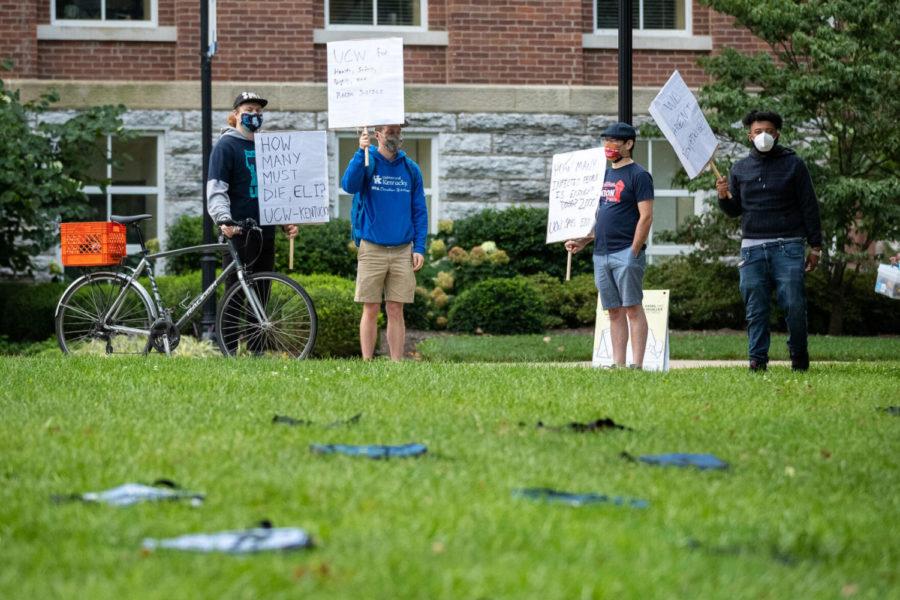Concerned groups stage campus display over COVID-19 risks
September 17, 2020
Seventy backpacks lined the grass in front of UK’s Main Building this morning, each representing a potential student life that could be lost due to COVID-19 on campus.
The backpacks were laid out by members of the Movement for Black Lives and United Campus Workers Kentucky, two campus organizations that have been increasingly vocal about their unease with UK’s COVID-19 reopening policies.
The Main Building houses the administrative offices on campus. The idea to lay out the backpacks came from Khari Gardner, founder of MBL, according to UCW member Matt Heil.
Gardner said he calculated the number of backpacks that indicated potential student deaths from an Inside Higher Ed article that included projections for Georgia Tech.
“Similar size school, similar reopening plans, so we just take some of the potentials over there and we applied them over here,” Gardner said.
The Inside Higher Ed article predicted 75 fatalities at Georgia Tech if the campus did not promote masks or implement social distancing policies; the number of deaths was calculated assuming that half of the campus community tested positive.
UK spokesperson Jay Blanton said the factors in the Georgia Tech projection, including non-compliance with social distancing, are not the case for UK’s campus.
“The vast majority of people on our campus are complying with these guidelines and standards – from mask wearing to physical distancing and other mitigation strategies,” Blanton said. “One point that reinforces that statement is the fact that more than 70 percent of students are complying with daily screening.”
Gardner said the backpacks represent the “loss of life that could happen if the university doesn’t change plans.”
Gardner, along with members of UCW, are asking for repeated mandatory testing, hazard pay for workers, accountability for social distancing and increased transparency about UK’s COVID-19 metrics.
“Asking for the university to not treat us as dollar signs and percentages,” Gardner said. “This is life, this is people’s lives, and this is maybe people’s lives well beyond just these students. We could be talking about workers losing their life, we could be talking about so many different people affected by a potential outbreak on campus.”
For UK employee Matt Heil, the main change he would like to see is increased flexibility for campus staff. He said he is on campus for eight hours a day, and that it is “inherently dangerous” and “not great.”
Heil wants all employees who can work from home to be able to work from home. UK said that decisions about WFH were made on a departmental level.
“But like, the administration here also has the power to make that happen, so thats not an excuse anymore,” Heil said.
Heil and Gardner both said that they want greater transparency from UK, particularly regarding the campus positivity rate.
The Kernel reported last week that UK calculates the positivity rate by dividing the number of active cases by the number of people who were required to be testing because they are coming to campus, a formula that Gardner called “wonky.”
Positivity rates are normally calculated by dividing the number of positive tests by the total number of tests, and can be reported on a daily, weekly, or monthly basis.
Blanton said the university believes active cases, recoveries and isolation and quarantine capacity are the most important numbers to monitor for the scope of the virus on campus.
“We believe that reflects the current health and status of our campus. Further, we have the capacity to, every day, communicate with, and receive information from, our population that’s coming to campus, Blanton said. “Each member of our community who comes to campus is required to complete the daily screener, which provides us with information regarding symptoms and whether they have been in contact with someone who is exposed.”
Transparency was a big concern for Heil, who is frustrated with the continued positive press put out by the university.
“A lot of us are scared,” Heil said. “It’s time to do something. It’s time to at least be transparent about the metrics that you have for these six, seven bullet points that he [Eli Capilouto] keeps giving out about what it’s going to take to close campus or take the next step.”
Heil believes it is time to take the next step, as last week UK hit 1,000 cases since the beginning of the semester.
According to UK’s dashboard, there were 444 active cases among UK students as of Sept. 13. The Lexington-Fayette County Health Department, which releases a daily update, now reports 1,600 cases of COVID-19 among UK students, 1,369 of which have been reported since the first day of classes on Aug. 17.
Blanton said the university works with the START team to plan next steps around testing and other campus guidelines, and that d”ata and science will inform and drive our decisions.”
Gardner called UK’s tactics about metrics and press releases “manipulative.”
UK received a lot of press coverage on Monday of this week, when White House coronavirus coordinator Dr. Deborah Birx visited the campus, met with administrators and commended UK’s reopening efforts.
Gardner said that while he respected Dr. Birx, he did not necessarily agree with her assessment.
“She’s been the mouthpiece for an administration that has bungled their COVID-19 response for the past what, six months now? So it’s kind of a problem for me to take everything she says as 100 percent truth,” Gardner said.
Heil wants President Eli Capilouto to meet with the campus groups directly to hear their concerns.
“It’s past time for transparency, it’s past time to tell us whats really going on and it’s past time for those of us that are here, the most directly affected, to have a voice,” Heil said.
Blanton said that there are no further meetings planned between UCW and the president.
































































































































































